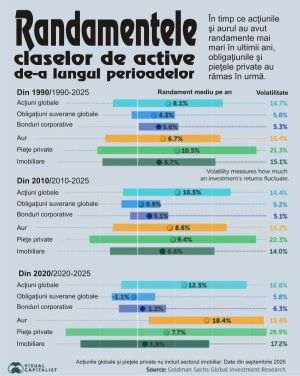China is conquering the port infrastructure in Europe while the European Commission seems concerned only with supporting Ukraine and less with combating its influence on the territory of the European Union. According to several articles published in the European media, a situation drawn up by the European Parliament and a study carried out in April 2024 by the Franco-German Economic Relations Committee (CERFA) through the French Institute of International Relations (IFRI), the Chinese have invested in the last 20 years in 31 ports in Europe, where they have bought several stakes. The 31 European ports are part of a trove of 96 ports owned and/or operated by Chinese companies in foreign jurisdictions, according to Isaac Kardon, an expert at the US Naval War College. In 29 of the 96 ports, China is the only operator, a fact that shows the size of that expansion. Moreover, the American expert claims that Chinese companies are directly involved in 83% of the operations carried out in the 96 ports, that 36 of the 96 ports are among the top 100 in the world, measured according to container throughput.
The cited sources mention that major Chinese companies have investments in 31 container port terminals in Europe, starting from Greece and Malta to Germany, Sweden and Poland. These include some of the largest and most active ports on the continent, such as Rotterdam, Hamburg and Valencia. Chinese companies have full or majority control in only two: Piraeus in Greece and Zeebrugge in Belgium.
A 2022 study by Sinolytics, a European consulting company, identified 34 port terminals in China with one or more foreign investors. Only four, however, owned more than 50% of the terminals, leading the Sinolytics team to conclude that there is "a de facto barrier to the acquisition of larger shares for foreign investors and may suggest some informal investment barriers."
• COSCO Shipping Ports has taken its share of the... dragon
In almost all cases, three major Chinese companies-COSCO Shipping Ports (the world's largest shipping company and largest port terminal operator), Hutchison Port Holdings (the world's second largest port terminal operator) and China Merchants Ports (CMP, the world's sixth largest port operator) manages several assets in its 31 European ports.
Cosco is the largest Chinese investor in European ports. The state-owned company owns 100% of Piraeus Terminals 1 and 2 and 67% of Piraeus Port shares. Cosco is also a majority shareholder in the Belgian port of Zeebrugge, where it has a 90% stake, and recently acquired a 24.99% stake in the port of Hamburg after threatening to change the port of destination for Chinese cargo if it did not get a raise of the share package. In addition to those ports, the company also holds minority stakes in container terminals in Antwerp (Belgium), Las Palmas (Spain) and Rotterdam (Netherlands) and has majority stakes in container terminals in the Spanish ports of Valencia and Bilbao.
The second Chinese concern that has stakes in European ports is China Merchants Group, which is like Cosco, a Chinese state company, but based in Hong Kong. Its subsidiary, China Merchants Port Holding (CMP), is the sixth largest port terminal operator in the world and owns 49% of the shares of Terminal Link, a company through which it has minority stakes in the ports of Rotterdam (Netherlands), Antwerp (Belgium), Le Havre ( France), Thessaloniki (Greece) and Marsaxlokk (Malta). A highlight of the company's activity was the purchase in 2019 of ten terminals from the French company CMA CGM.
The third major Chinese player in European ports is CK Hutchinson Holdings, a group registered in the Cayman Islands but headquartered in Hong Kong. Its subsidiary, Hutchison Holdings Ports (HPS), is the second largest port terminal operator globally and has interests in the ports of Rotterdam, Stockholm, Barcelona, Gdynia (Poland) and the UK ports of Felixstowe, Harwich and Kent. The company also operates several river ports in Europe, according to the sources cited. Hutchison began to has been buying European port assets since 1991 and has continued to steadily expand its European port portfolio.
From a geographical point of view, Chinese companies have made acquisitions of port assets throughout Europe, being present in the ports of Greece (Port of Piraeus and Thessaloniki), Malta (Malta Freeport Terminal), Italy (Vado Reefer Terminal), Spain (CSP Bilbao Terminal and CSP Valencia Terminal), France (Terminal de France, Terminal Nord, Terminal du Grand Ouest and Terminal de Mediterranee), Belgium (Terminal des Flandres, CSP Zeebrugge Terminal, Antwerp Gateway), Netherlands (Euromax Terminal and Rotterdam World Gateway) and Germany (Tollerort Terminal in Hamburg).
The large number of European ports with a Chinese investment demonstrates that for a time China's approach has found fertile ground, and those investments have ensured a safe delivery process for Chinese products to European markets, with Chinese shipments being channeled through owned terminals and ports on the old continent, strengthening the logistical autonomy and control of the Beijing authorities over international trade routes.
• The takeover of European ports by the Chinese - increased security risk for EU member states
Experts in the field told the cited sources that the takeover of control of some European ports by Chinese companies poses an increased security risk for the EU member states and even for the EU bloc. According to them, a law issued by the Beijing authorities in 2017 requires Chinese companies and overseas subsidiaries in the international transport sector to provide supplies and support ships, aircraft, vehicles and personnel for the country's military operations without drawing lines of demarcation. demarcation between domestic and foreign jurisdictions or between private and state enterprises. In other words, the Chinese government can intervene in their operations and tell them what to do.
There are some key aspects to consider regarding the influence of Chinese owners on European ports. First, there is the potential to alter the flow of goods from one European port to another. Companies like Cosco could divert traffic to ports or terminals they own, distorting the market. Moreover, these actions represent a potential geopolitical tool for Beijing, which can exercise control over the activities of companies such as Cosco and combine business expansion goals with its geopolitical goals. That's because Chinese shipping companies have secured major stakes in 24 European ports between 2004 and 2021, confirming the strategic expansion of Chinese influence in key European infrastructure. For example, in the Greek port of Piraeus, not only has Cosco increased its stake by becoming the majority shareholder, but the involvement of Chinese companies has expanded from maritime transport, to cargo loading and unloading, to rail transport. Cosco also tried to implement Chinese port management software. In terms of cargo diversion, the sources cited show that the process leading to Cosco's acquisition of a 24.99% stake in the German port of Hamburg included a threat by the Chinese company to divert cargo to the ports of Antwerp and Rotterdam, where has minority shares, in case the sale of the said block of shares is not approved.
Related to the risks of Chinese holdings, the French and German experts in the IFRI study show that knowledge of the technical inner workings of European container terminals could be used by Chinese companies as valuable information, which could in some cases lead to the disruption of transport operations maritime and supply chains. The cited source claims that there is a possibility that
Chinese shareholders to have a long-term influence on the further development of port infrastructure and its connection to domestic transport networks. In the long term, this could give a foreign power the opportunity to influence the development of European transport infrastructure to its advantage.
• Management of port information by Chinese companies, a permanent danger for European states
Experts warn of serious security issues arising from these takeovers and call for more effective measures to maintain control over critical infrastructure. Independent Polish media reported that in August 2023 a US ship supposed to pick up military equipment was denied access to the Polish port of Gdynia until it paid a "prohibitive" fee to Hutchinson Port Holdings, a Chinese company that ran the terminal. That news did not appear in any official source of information, but if real, it would be the first evidence that Beijing's aggressive efforts to build and develop infrastructure in foreign countries will allow the companies that operate those facilities to promote the interests of the Chinese government rather than those of host nations, the sources said.
More likely is the use of port surveillance and control to gather information. Even though ports are usually divided into civil and military sectors, the two sectors adjoin each other, providing ample opportunities to keep an eye on the activities in adjacent facilities, noting not only shipping but also construction and other activities. For example, the military shipyards in Gdynia build Poland's newest missile frigates, and other facilities house a naval special operations unit that trains in the area, as well as a transshipment terminal that supplies strategic fuels to local depots. Military experts have claimed for the sources cited that the Chinese are gathering information from all ports outside of China. They show that Chinese assets in European ports - ships, cranes, containers and trucks - are part of a huge network that constantly monitors global trade, especially since China created the LOGINK system - the National Transport and Logistics Public Information Platform - to logistics data management, shipment tracking and business-to-business and business-to-government information sharing. Subsidized by China's Ministry of Transport and provided free to all supply chain participants, the cloud-based software platform last year had 24 international ports signing agreements to use LOGINK, including the Japanese ports of Tokyo/Yokohama. , Kawasaki, Osaka, Kobe and Niigata.
Experts say this information, combined with Chinese companies' control of assets at certain ports, gives Beijing the ability to delay, degrade or disrupt trade in ways that can frustrate or pressure foreign governments and influence geopolitical conflicts. Gdynia is not on the front lines of the invasion of Ukraine, but it plays a crucial role in transporting military and civilian equipment to the besieged country. Rerouting of equipment is possible but takes time and many alternative ports are also run by Chinese entities.
Looking at the big picture, not only have Chinese actors acquired stakes in a wide variety of strategic, critical European infrastructure such as ports, but through strategic industrial policy China has also managed to capture large parts of value chains essential for the European economy. China is also one of the main suppliers of raw materials needed by European industry. These combined factors give China the power to exert pressure on European states to align them with its economic and political interests.




































